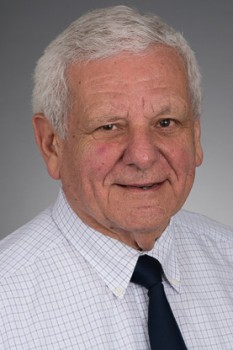By Joe Luk
Chancellor Emeritus Albert Carnesale has been selected to serve on a high-level national commission that will study and make recommendations for developing a safe, long-term solution to the serious problem of managing the nation’s nuclear waste.

Albert Carnesale commented on his appointment to a commission regarding long-term management strategies for nuclear waste in the United States
President Obama directed the U.S. Department of Energy to form the 15-member Blue Ribbon Commission on America’s Nuclear Future to conduct a comprehensive review of policies for managing the country’s current and future stockpile of nuclear waste after the administration decided not to proceed with the Yucca Mountain (Nevada) nuclear waste repository.
“The decision to pursue the Yucca Mountain plan was made 20 years ago,” Carnesale said. “From a scientific and technological perspective, much has been learned since then about radioactive waste and how spent nuclear fuel can be treated. And much has also been learned about the Yucca Mountain site itself.” The residents of Nevada also vehemently opposed the plan for a number of reasons.
The question of what to do with the country’s nuclear waste has grown in urgency because of climate change and the nation’s search for a cleaner source of fuel.
Currently, spent nuclear fuel is being stored at more than 100 nuclear power plants throughout the United States. These plants provide about 20 percent of the nation’s electricity.
“I don’t think there are many people who think that is a very good long-term solution to the waste problem,” Carnesale said.
“The commission is not being asked to identify an alternative site to replace Yucca Mountain,” Carnesale said. “There are many other avenues of inquiry to pursue. For example, are there new designs for nuclear rectors that might mitigate the problem? Should the spent fuel be processed differently? How might the spent fuel or processed waste be stored to minimize the risk to current and future generations?”
“The solution won’t be found in science and technology alone,” Carnesale said.
“If you look at the commission, these are not simply experts on nuclear power or nuclear waste,” he said. “They are primarily strategic thinkers, people who understand issues that have substantial technological dimensions, but cross many high-priority areas for the country, everything from climate change to reducing American dependence on foreign sources of fuel. It’s clear that the commission has been asked to take a strategic look at this problem.”
The commission is co-chaired by former Indiana Congressman Lee Hamilton and Brent Scowcroft. Hamilton is a member of the President’s Intelligence Advisory Board and the President’s Homeland Security Advisory Council, and he previously served as vice chairman of the 9/11 Commission (National Commission on Terrorist Attacks Upon the United States). Scowcroft, a retired lieutenant general in the U.S. Air Force, served as National Security Advisor to both Presidents Gerald Ford and George H.W. Bush.
Carnesale, who has a Ph.D. in nuclear engineering, holds professorial appointments in UCLA’s School of Public Affairs and Henry Samueli School of Engineering and Applied Science. Earlier in his career, he represented the United States in high-level negotiations on defense and energy issues, including the Strategic Arms Limitation Talks, SALT I. He has been increasingly called upon by the government for his expertise on public policy issues that have scientific and technological dimensions.
Since leaving Murphy Hall as chancellor, he has led committees formed by the National Academies, the nation’s science advisors, to analyze, make recommendations and brief policymakers and Congress on vital issues. In 2008, he chaired a committee that looked at whether the nation needs a non-nuclear weapon with the ability to strike a target anywhere in the world within one hour after the president gives the order.
Recently, he has been holding classified briefings with representatives from the departments of Energy, Defense and Homeland Security as well as others on Capitol Hill on the findings of a committee he chairs on nuclear forensics.
Carnesale is also chair of the Committee on America’s Climate Choices, a nationwide project launched by the National Academies at Congress’ request for policy-relevant advice, based on scientific evidence, to help guide the nation’s response to climate change. That project, which involves some of the country’s leading researchers on climate change, is scheduled to release its report in September.

